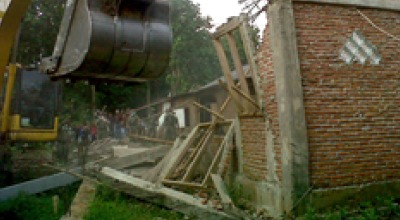Cheers went up as a backhoe tore down the barely finished walls of the Batak Protestant Church near Jakarta, Indonesia on Thursday.
The pile of rubble that remained was only the latest setback to Christians trying to retain a toehold in the world’s most populous Muslim country.
The church, in the Bekasi subdistrict of Jakarta on the Indonesian Island of Java, had been meeting in a residential house every Sunday for the past 13 years. When the congregation swelled to about 600 members, Pastor Adven Leonard Nababan applied early this year for a building permit. The church obtained signatures of 60 non-Christian neighbors, as required by law.
Certain the church had met all the permit rules yet mindful that local governments in Indonesia can be slow to approve them, Nababan ordered construction to proceed a not uncommon practice among churches in a country where applications often languish.
But when the walls began to go up in January, about 750 Bekasi Muslims took to the streets in protest. On March 5, police sealed the site and told church elders to demolish what had been built so far. They refused.
Bekasi officials declared the 60 signatures to be fake, and sent their own demolition crew to the church building site last week, in a sector called Taman Sari. About 150 members of Batak Protestant Church, commonly referred to as HKBP, were waiting, singing hymns and praying.
“They locked arms and stood together in front of the church to stop the demolition team,” a witness to the demolition said. “The HKBP pastor stood in the midst of his congregation. He said to them, ‘We are part of the Body of Christ.’”
“Not far from the HKBP pastor were about 300 Muslims who clapped their hands and shouted ‘Alahu Akbar,’ ” he said. “Some are members of the Islamic Peoples’ Forum and the Islamic Defenders Front. They wore white robes.” The witness, a Christian who said he ministers to Muslims who have converted to Christianity–a touchy subject in Islamic societies–asked not to be publicly identified.
Civil Service Police Chief Dikdik Astra said he was simply following district orders. He denied assertions by the Jakarta Legal Aid Foundation and HKBP leaders that he and Bekasi officials were pressured by Islamists.
Christian churches often have difficulty navigating the bureaucracies of local government.
Several kilometers from the demolished Taman Sari church is HKBP Filadelfia, denied a building permit in 2007. Among the country’s most notable cases is the GKI Yasmin church in nearby Bogor, whose building permit was revoked in 2008 due to opposition from residents. Members of both churches hold their Sunday worship in the street opposite the Jakarta State place.
A pastor of the Rahmani Indonesia Church in Bekasi told World Watch Monitor he had considered applying for a building permit, but decided to postpone it until a new mayor was elected.
“One candidate promised that he would grant me the permit if he was elected,” the pastor said. As with the witness to Thursday’s demolition of the HKBP church, the pastor asked not to be named because of his work with Muslim converts to Christianity.
Indonesia held provincial and local elections Jan. 22. Most candidates in West Java came from political parties with conservative Islamic leanings, such as the Prosperous Justice Party, or PKS, to which incumbent provincial Governor Ahmed Heryawan belongs.
“A young, dynamic party with an Islamist outlook, the PKS made great gains in the 2004 parliamentary elections,” said a 2005 Council on Foreign Relations report on local Indonesian elections. “It has strong support on the western island of Sumatra. The party says it supports diversity, openness, and freedom of religion, and has won widespread respect for its disciplined organization and strong anti-corruption message. Experts say, however, it is not yet clear if the PKS is really as tolerant as its members claim, or if a more restrictive agenda will emerge more strongly in the future.”
Indonesia’s presidential election is scheduled for 2014. Several Christian leaders in Bekasi told World Watch Monitor they expect tensions to rise as Islamic political parties use religion to win votes. Ninety percent of Indonesians citizens are Muslim.
“Islamist militant groups, such as the Islamic People’s Forum and the Islamic Defenders Front, have been implicated in attacks and arson on houses of worship and homes of members of minority religions,” according to a Feb. 28 Human Rights Watch report. “Such groups seek to justify violence by espousing an interpretation of Sunni Islam that labels most non- Muslims as ‘infidels,’ and Muslims who do not adhere to Sunni orthodoxy as ‘blasphemers.’ ”
In 2012, Indonesia’s Setara Institute, which advocates social, ethnic and religious tolerance, reported 264 cases of violence against religious minorities, a 20 percent increase from its 2011 figures. On Jan. 31, the prosecutor’s office in Sumedang, West Java jailed Pastor Bernard Maukar of the Indonesia Pentecostal Church for three months for operating a church without a permit. Maukar denied the charges against him, but later told Open Doors International, a worldwide ministry to Christians under pressure for their faith, that he signed a prefabricated affidavit admitting the charge in a police station as members of the Islamic Defenders Front stood by.
Open Doors has recorded an average of 66 cases of church incidents per year since 1998, the end of former Indonesian President Suharto’s reign. Fifty-three years ago, church attacks averaged nine cases a year.
Indonesia is No. 45 on the 2013 World Watch List, a ranking of the 50 of countries most hostile to Christians, published annually by Open Doors.
On Thursday amid the rubble of Batak Protestant Church in Taman Sari, the witness to the event said he managed to get a private moment with pastor Nababan.
“I managed to get closer to him and we prayed together,” the witness said. “This Sunday, he said that they will still meet at the church ruins, even though there are no roof and walls.”
See an error in this article?
To contact us or to submit an article




















